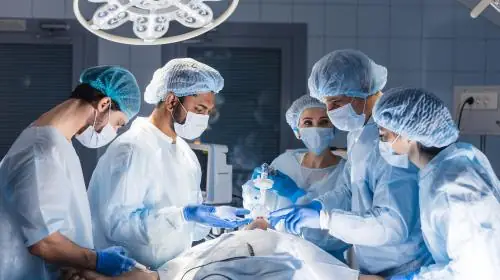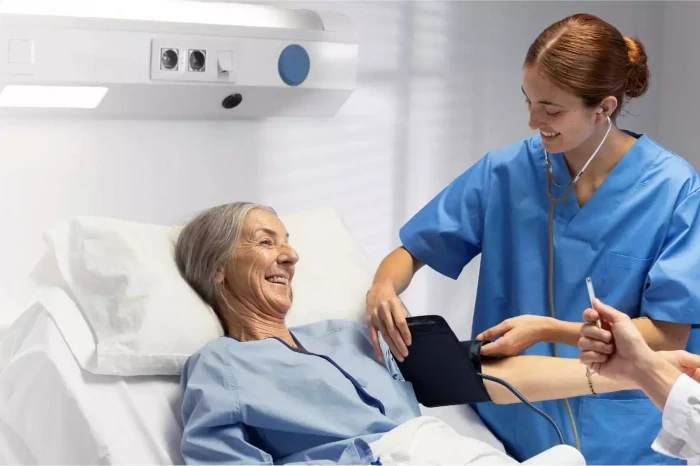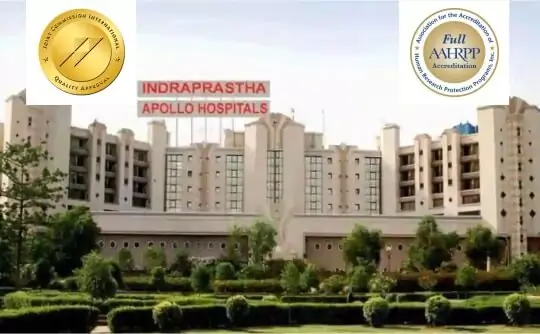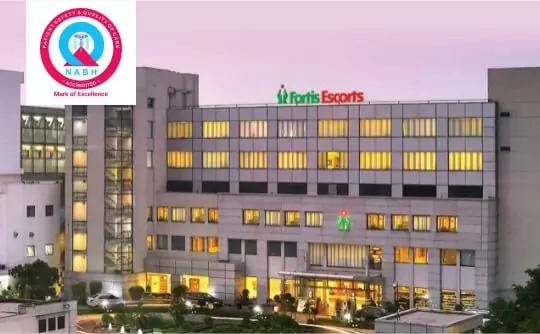

The primary cost factor in Aortic Valve Replacement surgery is the type of valve selected—either a mechanical valve or a tissue (biological) valve. The choice between these options depends on various considerations, including your medical history, age, lifestyle, and individual health factors. Your doctor will recommend the most suitable valve type for you based on these criteria to ensure the best possible outcome for your specific condition.
A significant component of Aortic Valve Replacement Cost in India is the heart surgeon's fees. IndiCure recommends highly experienced, skilled, board-certified heart surgeons who can deliver excellent results. While the charges may vary based on the surgeon's experience, you can be confident that you are in safe and capable hands when opting for having affordable heart surgery in India with IndiCure's chosen hear surgeons.
In order to improve patient care, new techniques and technologies are continuously introduced into surgical procedures. While these innovations aim to enhance treatment outcomes, shorten recovery times, and boost overall effectiveness, they may also contribute to higher Aortic Valve Replacement costs in India.
Selecting an accredited medical facility with skilled and qualified medical staff is essential for the success of Aortic Valve Replacement surgery in India. Bigger cities in India generally provide superior medical facilities and more experienced heart surgeons, leading to higher cost of aortic valve replacement in India. However, to ensure quality care and safety of our international patient guests, IndiCure Health Tours recommends surgical facilities in these larger cities only.
The total procedure cost for aortic valve replacement in India comprises pre and post-surgical expenses. Pre-surgical costs depend on the patient's age and medical condition, which determine the necessary tests and investigations. The post-surgical costs for aortic valve replacement largely involve prescription medications and follow-up consultations.
After receiving medical reports, your case manager will provide an estimated cost for aortic valve replacement in India based on a discussion with the heart surgeon. We at IndiCure consolidate most of the expenses for your Aortic Valve Replacement Cost in India to provide you with an inclusive and cost-effective package tailored to your budget and individual requirements.
The final Aortic Valve Replacement Cost in India can however be confirmed after your face-to-face consultation with the heart surgeon.

We Help you Choose the Right Treatment, Surgeon & Hospital

We Arrange Video/Telephonic Consultation with the Surgeon

We Assist you with Visa & Accommodation

We Receive you at the Airport and Drop you at Hotel/Hospital

We Assist you the at Hospital & Provide Post Operative Support
IndiCure Health Tours partners with top hospitals in India and negotiates special rates for medical procedures, ensuring you get the best possible price on your healthcare when you plan your medical tour with us. This enables you to avail exclusive savings on your medical travel to India.

Here is a set of questions you should consider asking before commencing your journey for Aortic Valve Replacement surgery in India.
Prepare to answer questions about your:
Aortic valve repair and replacement are operations used to address disorders of the aortic valve, which is one of four valves that regulate blood flow through the heart.
The aortic valve keeps blood flowing through the heart in the right direction. It connects the main pumping chamber of the heart (left ventricle) to the major artery that carries oxygen-rich blood throughout your body (aorta).
The aortic valve opens with each ventricular contraction, allowing blood to flow from the left ventricle into the aorta. The aortic valve closes when the ventricle relaxes, preventing blood from flowing backward into the ventricle. When the aortic valve isn't functioning properly, it can obstruct blood flow and make the heart work harder to pump blood to the rest of the body. Aortic valve repair or replacement can help treat aortic valve disease by restoring normal blood flow, reducing symptoms, prolonging life, and preserving heart muscle function. Surgery for aortic valve disease is associated with the severity of your condition, whether you have signs and symptoms, and whether your condition is worsening. Aortic Valve Repair or Replacement is advised when:
The aortic is the most commonly replaced valve. The replaced valves can be made either of tissues from animals or humans and mechanical valves made of man-made material.
The Valve Replacement surgery is indicated in the following conditions:
Congenital Heart Valve Diseases such as narrow or leaking valves, and bicuspid aortic valves. Acquired Heart Valve Diseases such as Calcification of the valves, Infection such as Infective endocarditis or Syphilis, Rheumatic valve disease, Angina, tumors of the valve, Hypertension, enlarged heart muscles known as Cardiomyopathy, increased opening of the annulus of the valve and Aortic aneurysm to name a few.
Valve replacement surgery is done under general anesthesia and takes about four to five hours. The surgery is done either as an open-heart surgery where the patient is put on a heart-lung machine or rarely as beating heart surgery without the use of heart-lung machine, when the patient's heart is normally beating.
After the incision is made and breastbone and ribs are separated, the surgeon will then open the heart and will trace the faulty valve.
The edges around the valve are slightly sliced to help loosen it from the tendons that connect it to the rest of the heart and then the valve can be removed.
The new valve is then inserted and attached into place. After the surgery is done, the patient is taken off the bypass machine, and the chest is closed.
Aortic valve replacement surgery has an exceptional outcome and gives extremely satisfying results. The majority of patients who undergo the procedure return to normal activities after the operation. Their quality of life also improves because they no longer have difficulty breathing, fainting spells, or palpitations.

New Delhi
Indraprastha Apollo Hospitals, New Delhi is a state of the art multi speciality tertiary-care hospital situated in the most posh area of South Delhi. Considered to be the flagship hospital of Apollo group, Indraprastha Apollo Hospital is one of the important landmarks not only in Delhi, but in the world map because of its popularity among the medical tourists. The hospital has been one of the most sought after medical institutions for patients from Asia Pacific and beyond.

New Delhi
Fortis Escorts Heart Institute and Research Centre is one of the most revered medical institutions not only in India, but the entire world. The institute has set benchmarks in cardiac care with path-breaking work over the last 25 plus years. The hospital has the most advanced technology and has seen the best outcomes even in the most complex cardiac cases; be it cardiac surgery, Interventional Cardiology, Pediatric Cardiology, Pediatric Cardiac Surgery or Non-invasive Cardiology
The 5-year survival rate for aortic valve replacement (AVR) surgery is 94%. This means 94 out of 100 people who underwent AVR surgery could live at least 5 years.
| Heart valve replacement surgery | 5-year survival rate | 10-year survival rate |
|---|---|---|
| Aortic valve replacement surgery | 94% | 84% |
| Mitral valve replacement surgery | 64% | 37% |
| Pulmonary valve replacement surgery | 96% | 93% |
| Tricuspid valve replacement surgery | 79% | 49% |
Survival rates for heart valve replacement surgery are often used as predictors of how long patients can live beyond a certain number of years (5 years, 10 years) after the surgery. However, these may vary for you depending on your age, your overall health, and the current status of your heart function.
Reference:
https://www.medicinenet.com/survival_rate_of_heart_valve_replacement_surgery/article.htm
Aortic valve replacement is a serious procedure with potentially catastrophic complications. The chance of dying as a result of the procedure is believed to be between 1 and 2 percent. However, this risk is much smaller than the risk of not treating severe aortic disease.
Many factors influence whether an aortic valve should be repaired or replaced, including:
In general, heart valve repair is preferred over valve replacement because it lowers the risk of infection, retains valve strength and function, and eliminates the need for lifelong blood-thinning drugs, which may be required with some forms of valve replacement. Depending on the severity of the illness, patients with a hole in the valve's closing flaps (perforated valve leaflet) may be candidates for aortic valve repair rather than replacement.
Most valves, on the other hand, cannot be repaired, and heart valve repair surgery is generally more difficult than valve replacement surgery. Your best decision will be determined by your unique circumstances as well as the knowledge and experience of your medical team.
Choosing between a mechanical and tissue valve depends on several factors, including age, lifestyle, medical condition, and personal preference. Here's a comparison of each type:
Consult with your cardiologist to determine the most suitable valve for you based on your health history, age, and lifestyle. They can guide you through the options to ensure the best outcome for your unique needs.
Preparing for aortic valve replacement in India involves several key steps to ensure a smooth procedure and recovery:
Yes, medical tourism in India is popular, and many international patients explore the country during their recovery period. However, consult with your doctor first to determine a safe timeframe for travel and light activities based on your recovery status. It's typically recommended to rest for a few weeks following surgery before engaging in any travel activities.
Yes, most patients can resume normal activities gradually after recovering from aortic valve replacement. Your return to daily life and exercise will depend on your specific health condition, the type of valve replacement you had, and your overall recovery progress.
For the first few weeks, focus on rest, light walking, and breathing exercises as advised by your healthcare team. Avoid lifting heavy objects or engaging in vigorous activities.
Beyond the actual Aortic Valve Replacement Cost in India, one must consider these additional expenses:
Including these expenses beyond the cost estimates for Aortic Valve Replacement Cost in India helps ensure a smooth, comfortable recovery in India.
Enhance your medical journey to India by availing these extra services.
Traveling abroad for medical reasons may be challenging. With our experience of over a decade and working with the best surgeons and top hospitals in India, we help make your medical tour easier and safer for you. We will guide you at every step of the way and make end-to-end arrangements for your surgery, travel, and stay.
Ramandeep Dhaliwal
a month ago
I had great experience having rhinoplasty through Indicure. Dr. Ruchika from Indicure has helped me in finding best plastic surgeon, answering all my questions...
Read More
Joshua Archer
3 months ago
My name is Joshua Archer I'm from New Zealand, bay of plenty, kawerau I opted for the bypass surgery in January 2023 but planned it in advance for 28 September found IndiCure...
Read More
Kera Ren
8 months ago
Absolutely loved my experience with IndiCure - from first inquiring to meeting the surgeon pre op to my follow up post op. The surgeon was extremely approachable...
Read More
Andreana Paul
5 months ago
Had a wonderful experience. Visited India for my plastic surgery. From sending mails, airport pickup, comfortable accommodation and, to smooth hospital appointment booking...
Read More
Brandi Luce
5 months ago
I had the privilege of using Indicure's services for a cosmetic procedure that I had wanted for a long time but had always been apprehensive about. Ruchika helped me...
Read More
Jade M
3 years ago
Indicure Health Tours went above and beyond my expectations. They helped me with every aspect of my journey and were professional, kind and caring. I was...
Read More
The content on the website (www.indicure.com) is intended to be general information and is provided only as a service. All photographs on our website of before and after results are examples only, and do not constitute an implied or any other kind of certainty for the result of surgery.
Learn about IndiCure Health Tours' comprehensive editorial policy that strives to deliver trustworthy, helpful, relevant, accurate and people-first content on medical tourism in India.
It is not medical advice and should not be taken as medical advice. It should not be used to diagnose or treat a health condition and is in no way meant to be a substitute for professional medical care. You are advised to see a surgeon in person to assess what surgery may or may not accomplish for you.
It is also important to keep your expectations realistic and to understand that all surgical procedures carry risks and should never be taken lightly.